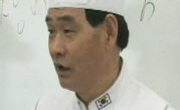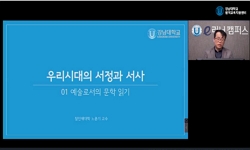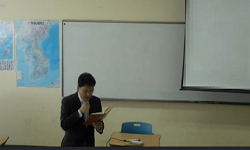After Liberation in 1945, the first important task of literature in North Korea was to clear away the remnants of bourgeois literature. The term ``Seojeong``(the lyrical/lyricality) should have been one of those remnants, because it was contaminated b...
http://chineseinput.net/에서 pinyin(병음)방식으로 중국어를 변환할 수 있습니다.
변환된 중국어를 복사하여 사용하시면 됩니다.
- 中文 을 입력하시려면 zhongwen을 입력하시고 space를누르시면됩니다.
- 北京 을 입력하시려면 beijing을 입력하시고 space를 누르시면 됩니다.

서정의 딜레마 -1950년대 북한 문단의 논의를 중심으로 = Dilemma of Lyricality -focused on the discussion of the North-Korean Literary field in the 1950
한글로보기https://www.riss.kr/link?id=A82592219
- 저자
- 발행기관
- 학술지명
- 권호사항
-
발행연도
2011
-
작성언어
-
-
주제어
서정 ; 서정시 ; 사회주의 리얼리즘 ; 서정적 전형 ; 서정적 주인공 ; 서정서사시 ; 안함광 ; 김명수 ; 리정구 ; 도식주의 ; 사실주의 서정시 ; 맑스-레닌주의 미학 ; Seojeong ; Lyrical poetry ; Lyricality ; the Lyrical ; Lyrical type ; Lyrical hero ; Lyrical epic ; Lyrical poema ; socailist realism ; socialistic poetry
-
KDC
700
-
등재정보
KCI등재
-
자료형태
학술저널
- 발행기관 URL
-
수록면
85-120(36쪽)
-
KCI 피인용횟수
4
- 제공처
-
0
상세조회 -
0
다운로드
부가정보
다국어 초록 (Multilingual Abstract)
After Liberation in 1945, the first important task of literature in North Korea was to clear away the remnants of bourgeois literature. The term ``Seojeong``(the lyrical/lyricality) should have been one of those remnants, because it was contaminated by ``bourgeois ideology``. But it has been used very frequently in the literary field of North Korea until now. This article is a study on how ``lyricality`` as the old-fashioned remnant have conflicted with one as the new socialistic literary element, focusing to the 1950` the period in which ``lyricality`` began to be discussed. It was at 1951 that the problem about ``the deficiency of lyricality`` was raised by An Hamgwang. It emerged as the contentious issue in the mid 1950` Major point was two ; one was to situate the lyrical poetry in the socialistic literature while taking it away from bourgeois literature ; the other was to apply the theory of socialist realism to the lyrical poetry, and then to construct the poetics of socialist realism. In order to do that, poets and critics debated on many kinds of literary terms including ``lyrical type``, ``lyrical hero``, ``lyrical epic/poema`` as genre, and discussed the theme of nature and love. Ironically, the more the discussion continued, the clearer was the incompatibility of that double task. When they emphasized the lyricality of socialistic poetry, it became similar to the lyricality of bourgeois poetry. Confronted with this aporia, it seems that they had no choice but to repeat ``lyricality`` compulsively.
참고문헌 (Reference)
1 이선영, "현대문학비평자료집 (이북편)" 태학사 1993
2 박찬모, "한효의 월북 이후 문학비평 고찰" 현대문학이론학회 (34) : 329-356, 2008
3 심경호, "주체적 문예이론과 서정시론" 예술과 비평 1991
4 "제2차 조선작가대회 문헌집" 조선작가동맹출판사 1956
5 김재용, "전후 북한문학의 도식주의 비판, in 분단구조와 북한문학" 소명 2000
6 현수, "적치 6년의 북한문단" 보고사 1999
8 이명현, "서정적 주인공에 관하여- 블록(А. А. Блок)과 상징주의 시대를 중심으로" 한국러시아문학회 (24) : 125-150, 2007
9 박기훈, "사실주의 서정시 강좌" 이웃 1992
10 오성호, "북한시의 사적 전개과정" 도서출판 경진 2010
1 이선영, "현대문학비평자료집 (이북편)" 태학사 1993
2 박찬모, "한효의 월북 이후 문학비평 고찰" 현대문학이론학회 (34) : 329-356, 2008
3 심경호, "주체적 문예이론과 서정시론" 예술과 비평 1991
4 "제2차 조선작가대회 문헌집" 조선작가동맹출판사 1956
5 김재용, "전후 북한문학의 도식주의 비판, in 분단구조와 북한문학" 소명 2000
6 현수, "적치 6년의 북한문단" 보고사 1999
8 이명현, "서정적 주인공에 관하여- 블록(А. А. Блок)과 상징주의 시대를 중심으로" 한국러시아문학회 (24) : 125-150, 2007
9 박기훈, "사실주의 서정시 강좌" 이웃 1992
10 오성호, "북한시의 사적 전개과정" 도서출판 경진 2010
11 신형기, "북한문학사" 평민사 2000
12 김경숙, "북한 시의 형성과 전개 과정 연구" 이화여대 2002
13 "문학예술, 조선문학"
14 이명현, "<징벌>의 서정적 프레임들" 한국러시아문학회 (20) : 47-92, 2005
15 심선옥, "1960년대 북한의 서정시론(1)" 3 : 1991
동일학술지(권/호) 다른 논문
-
- 우리어문학회
- 이길연 ( Gil Yeon Lee )
- 2011
- KCI등재
-
전후 일본의 북한문학 소개와 수용 -잡지 『민주조선(民主朝鮮)』을 중심으로
- 우리어문학회
- 오미정 ( Mi Jung Oh )
- 2011
- KCI등재
-
냉전기 북한의 중국 인식 -한국전쟁 후 중국 방문기를 중심으로
- 우리어문학회
- 정문상 ( Moon Sang Chung )
- 2011
- KCI등재
-
시대변화에 따른 라디오 광고언어의 전략과 표현 양상 비교연구 -초창기 라디오광고와 2008~2009년도 라디오광고를 중심으로
- 우리어문학회
- 김정우 ( Jung Woo Kim )
- 2011
- KCI등재
분석정보
인용정보 인용지수 설명보기
학술지 이력
| 연월일 | 이력구분 | 이력상세 | 등재구분 |
|---|---|---|---|
| 2027 | 평가예정 | 재인증평가 신청대상 (재인증) | |
| 2021-01-01 | 평가 | 등재학술지 유지 (재인증) |  |
| 2018-01-01 | 평가 | 등재학술지 유지 (등재유지) |  |
| 2015-01-01 | 평가 | 등재학술지 유지 (등재유지) |  |
| 2011-01-01 | 평가 | 등재학술지 유지 (등재유지) |  |
| 2009-01-01 | 평가 | 등재학술지 유지 (등재유지) |  |
| 2006-01-01 | 평가 | 등재학술지 선정 (등재후보2차) |  |
| 2005-01-01 | 평가 | 등재후보 1차 PASS (등재후보1차) |  |
| 2003-07-01 | 평가 | 등재후보학술지 선정 (신규평가) |  |
학술지 인용정보
| 기준연도 | WOS-KCI 통합IF(2년) | KCIF(2년) | KCIF(3년) |
|---|---|---|---|
| 2016 | 1.03 | 1.03 | 0.83 |
| KCIF(4년) | KCIF(5년) | 중심성지수(3년) | 즉시성지수 |
| 0.93 | 0.96 | 1.437 | 0.46 |




 KISS
KISS






